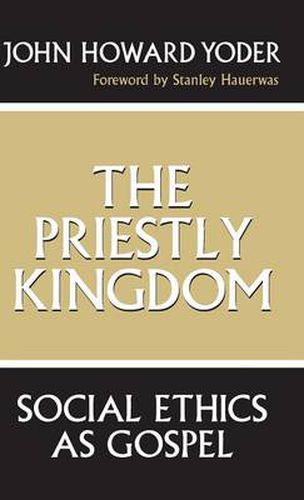Readings Newsletter
Become a Readings Member to make your shopping experience even easier.
Sign in or sign up for free!
You’re not far away from qualifying for FREE standard shipping within Australia
You’ve qualified for FREE standard shipping within Australia
The cart is loading…






This title is printed to order. This book may have been self-published. If so, we cannot guarantee the quality of the content. In the main most books will have gone through the editing process however some may not. We therefore suggest that you be aware of this before ordering this book. If in doubt check either the author or publisher’s details as we are unable to accept any returns unless they are faulty. Please contact us if you have any questions.
In this volume of essays John Howard Yoder projects a vision of Christian social ethics rooted in historical community and illuminated by scripture. Drawing upon scriptural accounts of the early church, he demonstrates the Christian community’s constant need for reform and change. Yoder first examines the scriptural and theoretical foundations of Christian social ethics. While personally committed to the radical reformation tradition, he eschews denominational categorization and addresses Christians in general. The status of Christian community, he argues, cannot be separated from the doctrinal content of beliefs and the moral understanding of discipleship. As a result, the Christian’s voluntary commitment to a particular community, as distinct from secular society, offers him valuable resources for practical moral reasoning. From a historical perspective, Yoder reviews the efforts of sixteenth-century radical (or Anabaptist) reformers to return to the fundamental ethical standards of the New Testament, and to disengage the community, as a biblically rooted call to faith that does not imply withdrawal from the pluralistic world. Rather, radical commitment to Christianity strengthens and renews the authentic human interests and values of the whole society. His analyses of democracy and of civil religion illustrate how Christianity must challenge and embrace the wider world.
$9.00 standard shipping within Australia
FREE standard shipping within Australia for orders over $100.00
Express & International shipping calculated at checkout
This title is printed to order. This book may have been self-published. If so, we cannot guarantee the quality of the content. In the main most books will have gone through the editing process however some may not. We therefore suggest that you be aware of this before ordering this book. If in doubt check either the author or publisher’s details as we are unable to accept any returns unless they are faulty. Please contact us if you have any questions.
In this volume of essays John Howard Yoder projects a vision of Christian social ethics rooted in historical community and illuminated by scripture. Drawing upon scriptural accounts of the early church, he demonstrates the Christian community’s constant need for reform and change. Yoder first examines the scriptural and theoretical foundations of Christian social ethics. While personally committed to the radical reformation tradition, he eschews denominational categorization and addresses Christians in general. The status of Christian community, he argues, cannot be separated from the doctrinal content of beliefs and the moral understanding of discipleship. As a result, the Christian’s voluntary commitment to a particular community, as distinct from secular society, offers him valuable resources for practical moral reasoning. From a historical perspective, Yoder reviews the efforts of sixteenth-century radical (or Anabaptist) reformers to return to the fundamental ethical standards of the New Testament, and to disengage the community, as a biblically rooted call to faith that does not imply withdrawal from the pluralistic world. Rather, radical commitment to Christianity strengthens and renews the authentic human interests and values of the whole society. His analyses of democracy and of civil religion illustrate how Christianity must challenge and embrace the wider world.